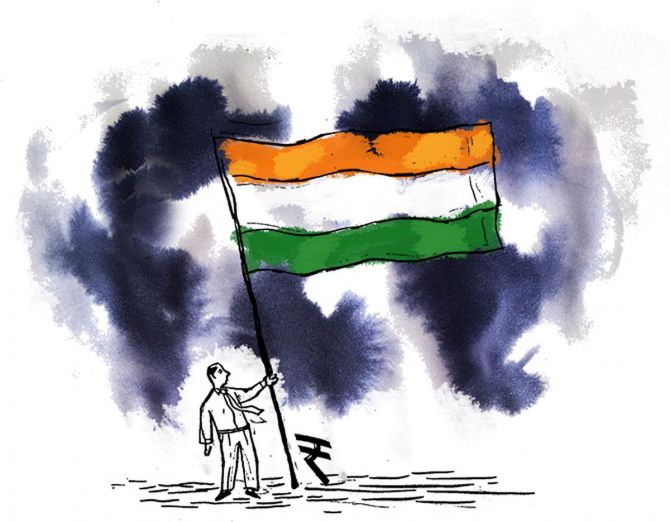Till such time that a new governance framework comes into being, the progress of reforms in health, education, land, labour, electricity and agriculture could remain fraught with problems, agitations and delays, observes A K Bhattacharya.

Last month saw the commemoration of the big-bang economic reforms, which were launched by the Narasimha Rao government three decades ago in July 1991.
A series of media commentaries from government leaders, economists and analysts captured the journey of those reforms in the last 30 years. In brief, the commentaries highlighted two broad trends.
One, after the burst of initiatives in the first 100 days of the Rao government with fundamental changes in trade, industrial and fiscal policies, economic reforms have by and large gone on, though at a varying and often slower pace.
Importantly, they have been continued by all the successive governments irrespective of their political affiliation.
Two, the approach of different governments to define what needed to be reformed and how those should have been implemented has not been uniform.
Thus, the United Front government moved rapidly on introducing a stable and low direct taxes regime, while the Vajpayee government moved relatively slowly but steadily on indirect taxes reforms.
The United Progressive Alliance government believed in rights-based policy reforms and enacted laws to guarantee the citizen's access to information, food, rural work and education.
The Modi government was a little slow in acknowledging the need for privatisation.
It has been planning to privatise Air India for several years and has now outlined a public sector policy that allows the privatisation of a host of non-strategic public sector units.
But even after seven years at the Centre, it is yet to privatise a single company.
This is in contrast with the speed at which the Vajpayee government sold over a dozen public sector units, even though it faced a political backlash.
In its first term, the Modi government launched the ambitious goods and services tax regime, but its implementation remained patchy with many imperfections.
In a bid to address the economy's twin balance sheet problem, it quickly enacted the law on time-bound insolvency and bankruptcy resolution, although this initiative is now facing a pushback.
In its second term, the Modi government relaxed foreign direct investment curbs in many sectors, but guided reforms in a different direction, which observers found to be protectionist and discretionary in spirit.
It raised import tariffs in many areas in an apparent bid to provide a level playing field to the domestic industry and provided financial incentives to encourage domestic investments in selected sectors.
An aspect that was missing in these commentaries was an assessment of why the reach of economic reforms in the last 30 years remained limited to a few sectors of the economy.
Nobody has offered a detailed analysis of why the much-needed reforms in the social sector like health and education, agriculture, labour, land, regulation and electoral funding have either been slow or non-existent.
An explanation of this failure to usher in what is popularly called the second-generation reforms could be that these are more difficult tasks, compared to the many policy changes that the country saw in the last three decades.
For instance, the 1991 reforms were seen as the proverbial low-hanging fruit, which could be plucked with relative ease.
Reforms in trade, industrial and fiscal policies required courage and a clear vision, but they were all within the domain of the Union government.
If there is now delay in privatisation, it is perhaps because of hesitation and reservations arising out of the kind of political consequences that the Vajpayee government had faced over this issue.
Somewhat similar has been the fate of reforms in regulation and electoral funding.
Governments have shied away from making the regulatory bodies in different sectors truly independent.
On electoral funding as well, there has been no meaningful initiative.
In the last several decades, regulatory bodies have been allowed to be captured by retired bureaucrats, friendly to the government of the day.
Worse, tribunals and appellate tribunals in different sectors have become weak with a rising number of vacancies at the level of members and chairpersons.
To top it all, the functions of many appellate tribunals are now proposed to be shifted to the high courts, burdening the latter with more cases.
Electoral funding laws have been changed, but for the worse.
The new law on electoral bonds introduced opacity about who contributed funds to political parties.
Funding data for different election years reveal that the ruling party has managed to corner the lion's share of such poll donations.
In short, the objectives behind reforms have been undermined as far as both regulatory bodies and electoral funding are concerned.
Neither has the regulatory structure emerged stronger or more independent, nor has electoral funding procedures become transparent and unbiased.
But the neglect of a host of other key areas, in desperate need of reforms, is truly disappointing.
After decades of wait and deliberations, the Modi government introduced reforms in three agriculture-related laws.
Of course, these laws were rushed through Parliament during the pandemic, but their broad intent and objectives were unexceptionable and the reforms to be achieved through them were long overdue.
Yet, faced with the continuing long-drawn agitation by farmers and the Supreme Court's intervention, those agriculture reforms remain suspended.
The new Labour Codes, ushering in the much-awaited flexibilities in labour laws, were passed a little more than a year ago and even gazetted.
But the rules for these four Labour Codes are yet to be framed and notified, thanks to the lack of unanimity among the states.
The Modi government now proposes the next phase of electricity sector reforms, by delicensing power distribution.
But some states have already opposed the move as they fear it could adversely affect the financial viability of the state-owned power distribution companies.
The proposal on delicensing power distribution, potentially a big reform, now awaits how the political movement gathers momentum in the states.
Early in the first term of the Modi government, the proposal on relaxing the land acquisition laws had met with strong political resistance.
That move was dropped in deference to the collective lobbying of states and the Opposition political parties.
What is obvious from the fraught journey of reforms in these critical areas like land, labour, agriculture and electricity is that they would not be easy to pull off unless there is a bigger reform.
That reform must take place in the governance framework creating a new compact between the Centre and the states.
The new compact must recognise and accept the need for a collaborative and consultative procedure to be followed for such policy changes.
Remember that the Indian Constitution does not give the Centre complete authority in framing laws pertaining to these areas.
The states must be taken on board while the Centre plans to bring about reforms in land, labour, agriculture, electricity as also in health and education.
The learning from the way the GST was introduced cannot be forgotten easily.
It was the consultative process that the then finance minister Arun Jaitley had introduced, which helped in persuading the states to give up their rights to independently fix tax rates for goods and services.
Such a spirit needs to be revived, based on which a new governance framework should be devised to determine the relations between the Centre and the states.
Till such time, the progress of reforms in health, education, land, labour, electricity and agriculture could remain fraught with problems, agitations and delays.
Feature Presentation: Aslam Hunani/Rediff.com











